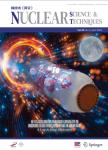Forced propagation method for Monte Carlo fission source convergence acceleration in the RMC
Forced propagation method for Monte Carlo fission source convergence acceleration in the RMC作者机构:Institute of Nuclear and New Energy TechnologyTsinghua UniversityBeijing 100084China Department of Engineering PhysicsTsinghua UniversityBeijing 100084China
出 版 物:《Nuclear Science and Techniques》 (核技术(英文))
年 卷 期:2021年第32卷第3期
页 面:52-62页
核心收录:
学科分类:08[工学] 082701[工学-核能科学与工程] 0827[工学-核科学与技术]
基 金:supported by the National Natural Science Foundation of China(Nos.11775126,11545013,11605101) the Young Elite Scientists Sponsorship Program by CAST(No.2016QNRC001) Science Challenge Project by MIIT of China(No.TZ2018001) Tsinghua University,Initiative Scientific Research Program
主 题:Fission source convergence acceleration Monte Carlo method Forced propagation method RMC code
摘 要:In loosely coupled or large-scale problems with high dominance ratios,slow fission source convergence can take extremely long time,reducing Monte Carlo(MC)criticality calculation *** various acceleration methods have been developed,some methods cannot reduce convergence times,whereas others have been limited to specific problem *** this study,a new fission source convergence acceleration(FSCA)method,the forced propagation(FP)method,has been proposed,which forces the fission source to propagate and accelerate fission source ***,some stabilization techniques have been designed to render the method more *** resulting stabilized method was then successfully implemented in the MC transport code,and its feasibility and effectiveness were tested using the modified OECD/NEA,one-dimensional slab benchmark,and the Hoogenboom full-core *** comparison results showed that the FP method was able to achieve efficient FSCA.



